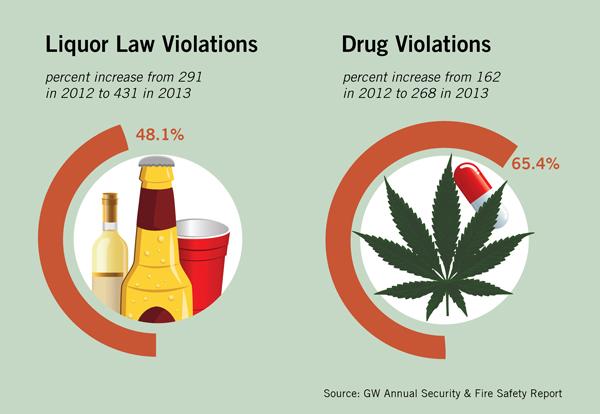A campus-wide crackdown on public intoxication partly caused a surge in reported violations last year.
Campus police officers began actively seeking out students who looked like they had been drinking alcohol, Senior Associate Vice President for Safety and Security Darrell Darnell said. That helped drive a 48 percent increase in alcohol violations, according to data released last week.
“It’s really a concerted effort on our part to really crack down on that,” Darnell said. “I’ve instructed my officers, and if they see individuals walking around campus and they look like they’re impaired, we’re going to stop them.”
Alcohol violations soared to 431 incidents in 2013. Violations have inched up slightly every year since 2009, and the 2013 jump was the largest during that time frame.
Since classes began this year, 79 alcohol violations have been tallied by campus police, according to the University’s crime log.
Matthew Malhiot, a consultant at Forensic Alcohol Consulting and Training, said campus police often focus on alcohol use to prevent other crimes like sexual assault or drunk driving. At least half of sexual assaults that occur on college campuses involve alcohol, according to Campus Safety magazine.
He added that an uptick in the recorded number of students breaking GW’s alcohol policy may not show the full picture of drinking on a campus.
“If you want to look at a problem, alcohol on campus, any problem, you have to look at the statistics that cannot be affected by enforcement,” he said.
Alcohol-related arrests on campus also jumped from one case in 2012 to 14 last year.
S. Daniel Carter, a national campus security advocate, said more interactions between officers and students may not be enough to reduce alcohol violations. He said the best approach is a combination of “enforcement, educational programming and alternative social events.”
“There is no evidence that any single action taken by any single unit of a college or university can significantly diminish the scope of alcohol abuse on campus,” he said.
GW requires freshmen to complete an alcohol and drug use training program online, and its alcohol education office holds events like the “Mix-Off” competition, where students are invited to submit a non-alcoholic cocktail recipe.

The University has also attributed the growing popularity of fake IDs to the increase in alcohol violations on campus. GW has teamed up with D.C. police and the city’s alcohol regulation agency to bust local liquor stores and bars for selling alcohol to underage customers or accepting fake IDs.
Darnell said while stopping students from selling fake IDs completely would be challenging, officers “proactively look for it when there’s an opportunity to look for it.”
GW saw one of the largest jumps in alcohol violations among D.C. schools in 2013.
Catholic University counted 611 alcohol violations, a 36 percent increase from 2012. American University saw a 13 percent decrease in violations, while Georgetown saw a 5 percent increase. Howard University has not yet released its annual report.
Drug violations at GW also rose about 40 percent last year to 268 incidents. Darnell said that increase stemmed from pushes nationwide to loosen marijuana laws.
While marijuana legalization will appear on the ballot in D.C. this November, Darnell said GW will keep its drug policies the same because possession and distribution of marijuana are still federal crimes.
“Whatever the law is, we’re going to follow federal law first and foremost,” Darnell said.
John Watson, the executive director of the higher education department at the insurance company Arthur J. Gallagher and Co., said federal and state laws for marijuana are “behind the curve” of public opinion on marijuana use, and said universities are even further behind. He oversees a department that represents 800 colleges and universities.
“It’s an area that’s going to continue to create turmoil until there’s some resolution,” Watson said.







